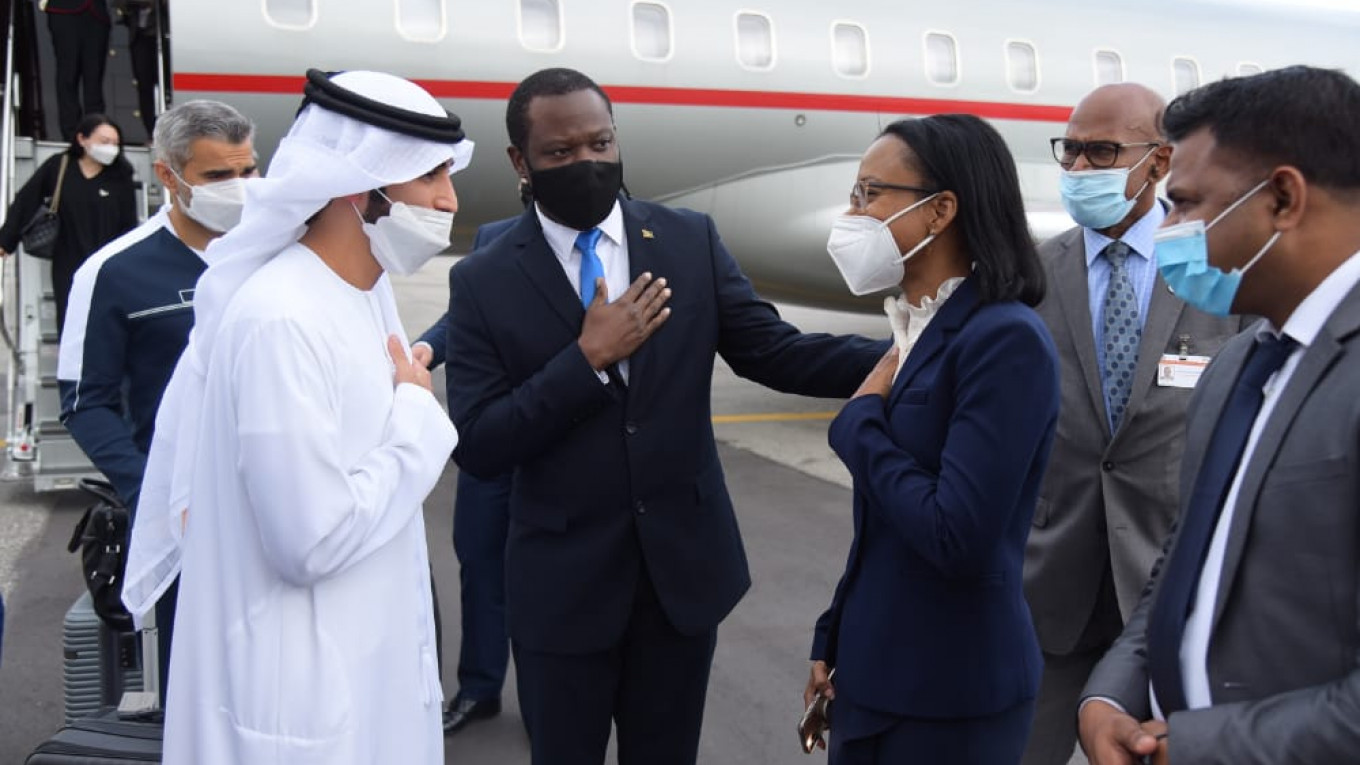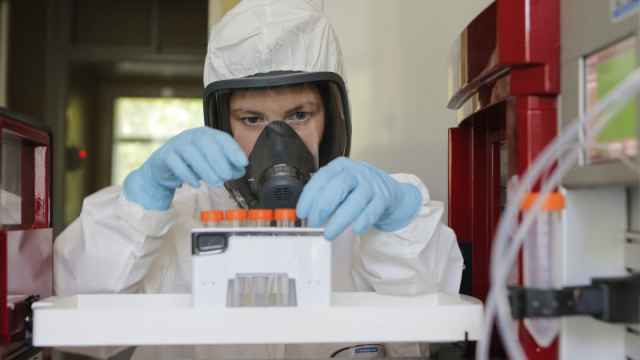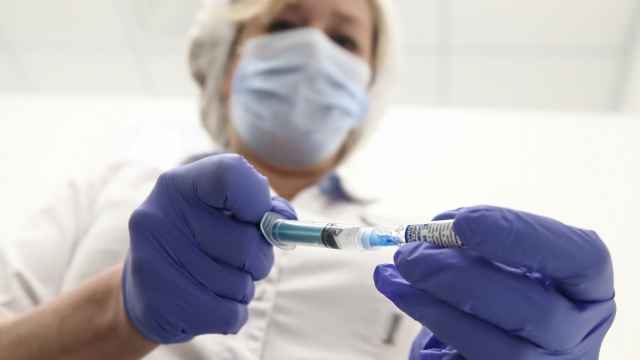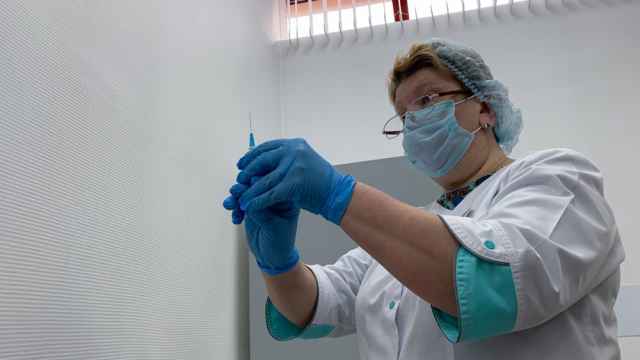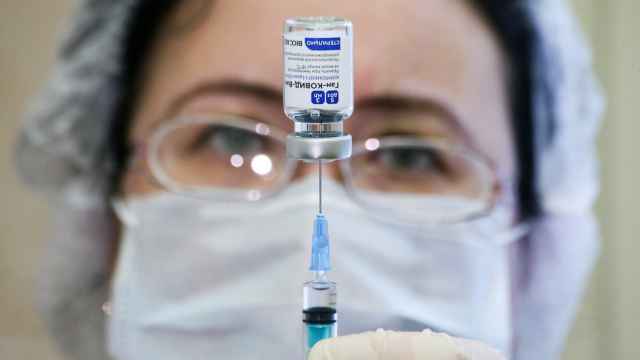Russia has awarded an Emirati royal exclusive rights to sell its Sputnik V coronavirus vaccine to a host of countries in at least three continents in a deal that has seen buyers paying huge premiums for supplies, a Moscow Times investigation has found.
Since the outbreak of the coronavirus, Russia has advertised Sputnik V as a “vaccine for all mankind” and promoted the jab across the developing world as a cheap route out of the pandemic. But documents obtained by The Moscow Times, as well as interviews with officials and vaccine buyers, show that countries from Pakistan to Guyana have been forced to deal with a royal middleman and companies based in the United Arab Emirates (UAE) acting as official Sputnik V resellers asking clients to pay more than double Russia’s advertised price to get their hands on the jab.
The deals have left a trail of controversy in their wake, threatening to undermine Russia’s already troubled vaccine diplomacy efforts.
The setup hinges on an arrangement between the Russian Direct Investment Fund (RDIF) and Aurugulf Health Investments, an Abu Dhabi-based company established late last year with close connections to Emirati royalty. RDIF granted Aurugulf exclusive rights to sell and distribute its flagship Sputnik V vaccine in countries around the world, documents reveal, with Sheikh Ahmed Dalmook al-Maktoum, a low-ranking Dubai royal, acting as the chief dealmaker.
Connections between Russia, Maktoum and the United Arab Emirates (UAE) over sales of Sputnik V in the developing world were first outlined by Norwegian outlet VG in an investigation published last month. While neither RDIF nor the Abu Dhabi company responded to requests for comment for this story, The Moscow Times has found a complex web of connections between the two leading to deals to supply millions of vaccine doses to some of the world’s most in-need countries.
The Sheikh and the scheme
On March 10, 2021, businessman Jacques Sarraf traveled to Abu Dhabi for a meeting about importing Sputnik V into Lebanon.
Sarraf, head of the Lebanese Russian Business Council, honorary Russian consul in Lebanon and chairman of the Malia Group conglomerate, had first been contacted by RDIF six months earlier as part of its sales drive to potentially interested parties.
Sputnik V had been authorized in Lebanon and Sarraf was interested in getting his hands on doses for Lebanon’s hard-hit private sector as supplies from the World Health Organization’s (WHO) Covax facility were slow to arrive.
RDIF put him in touch with Chimera Investments, an Abu Dhabi-based private investment vehicle linked to Aurugulf, which the Russians told Sarraf was the “regional distributor” for Sputnik V. They could strike a deal directly, RDIF said, without Russia’s involvement.
“I went there, I had a meeting in Abu Dhabi and told them I would be interested in getting Sputnik V,” Sarraf told The Moscow Times.
“They said ‘OK, you are our distributor in Lebanon.’ It was so easy. We placed an order that day for one million doses — 500,000 of each component — and agreed on a delivery schedule up until the end of August.”
The Lebanon deal was just one of a handful of Sputnik V supply agreements struck during the first months of 2021 between Maktoum and Aurugulf-linked investment companies on one side and governments and private healthcare companies across the world on the other.
Despite being some of the most crucial healthcare procurements in history, the deals needed no approval from Moscow as they fell under a sweeping agreement with an RDIF subsidiary named Human Vaccine giving Aurugulf and Maktoum the exclusive right to resell Sputnik V in the developing world, according to multiple documents seen by The Moscow Times.
Chimera Investments — the company Sarraf visited in Abu Dhabi — is a subsidiary of Royal Group, a sprawling conglomerate run by powerful royal Sheikh Tahnoon bin Zayed al-Nahyan, UAE’s national security advisor and brother of the current leader of Abu Dhabi. The al-Nahyan family is one of the six ruling families of the UAE.
Corporate registry data seen by The Moscow Times also shows that Royal Group is one of two entities controlling Aurugulf, which was registered in Abu Dhabi in October 2020 — two months after Sputnik V was authorized in Russia and weeks into RDIF’s intense marketing drive. The company has little corporate presence, according to registry data shared by corporate intelligence outfit Diligencia.
Aurugulf is named in multiple documents seen by The Moscow Times as the exclusive rights holder for the supply of Sputnik V in “many countries” around the world. In at least two instances — deals to supply millions of vaccines to private sector providers in Pakistan and Lebanon — Chimera Investments has also been involved.
“Aurugulf has been appointed … as the exclusive seller and distributor of … ‘Sputnik V’ adenovirus vector vaccine for Covid-19 in many countries of the world,” one letter sent from Aurugulf to an African government reads.
Minutes from a board meeting of Pakistan’s drug regulatory authority say it received a letter from RDIF confirming that “exclusive authorization has been issued by the first deputy CEO of RDIF, dated 8 November 2020, in the name of Aurugulf Health Investments … for many countries, including Pakistan.”
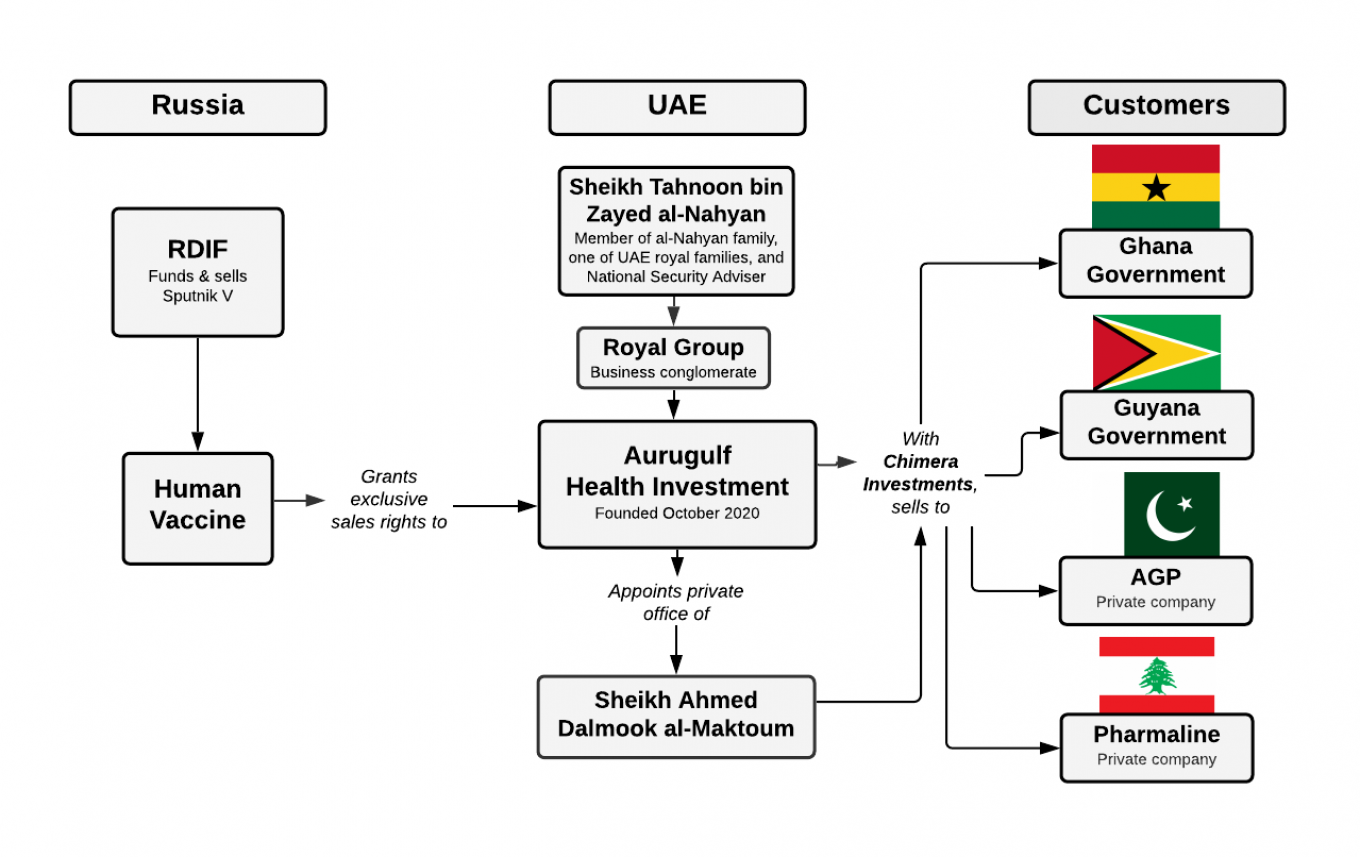
The scope of Russia’s agreement with Aurugulf and in exactly which countries RDIF has granted the company exclusive rights to sell, market and distribute Sputnik V are not clear. The Moscow Times found Aurugulf involvement with at least four countries that have already signed deals for Sputnik V jabs — Ghana, Guyana, Lebanon and Pakistan — alongside documents naming Aurugulf as the exclusive supplier in South Africa and local reports the outfit also has rights to sell to Indonesia.
The arrangement differs from Russia’s agreements to supply Sputnik V to EU members Slovakia and Hungary — both of which were direct agreements with RDIF’s Human Vaccine subsidiary to supply Sputnik V at $9.95 a dose, or $19.90 for the full two-component inoculation.
That compares with $19 per dose charged by Aurugulf to the Ghanian government, $24 in Guyana and $22.50 per dose paid by private provider AGP in Pakistan.
The point person striking Aurugulf’s potentially lucrative Sputnik V resale deals is Maktoum, who is loosely connected to the UAE regime through family and marriage.
Aurugulf, having received exclusive distribution rights from Russia for Sputnik V, subsequently “agreed to appoint the private office of His Highness Sheikh Ahmed Dalmook al-Maktoum” as the company’s “agent” to “develop, distribute and market our products” in a number of countries, including Pakistan and South Africa, documents obtained by The Moscow Times show.
Industry figures told The Moscow Times that Maktoum himself has explicit approval, endorsement and support from Moscow for selling Sputnik V across parts of the developing world.
“We were told by the Russian side that Maktoum is the exclusive seller of the vaccine to a number of countries, so we went through him,” an executive at one company importing Sputnik V told The Moscow Times, requesting anonymity.
An invoice shared with The Moscow Times by Pakistan’s Profit magazine lists “the private office of Sheikh Ahmed Dalmook al-Maktoum (through Chimera Investment)” as the supplier for a shipment of 50,000 doses at a price of $1.125 million to AGP in Pakistan. The bank details of Maktoum’s private office are listed as the recipient for the payment.
Middle Eastern analysts described Maktoum as a mid-ranking or lower-tier royal — somebody who can use his connections and access to score business deals around the world and act in concert with more senior royal figures to advance their business or political interests.
“He is known to have a strong network across Africa and has done a lot of work in Angola and Ghana before, in different sectors,” said Patrick Lord, Diligencia commercial director.
“It is not unusual for minor royals to trade off their ruling family connections, even if they are not actually very senior.”
Maktoum’s own business is the Ameri Group, which describes itself on its website as a company involved in energy, infrastructure and agriculture projects across 19 countries, mainly in sub-Saharan Africa.
Experts familiar with Maktoum and the world of Emirati politics and business, who declined to be quoted, doubted he would be operating without approval from above.
Local anger
The use of the Emirati scheme to sell Sputnik V has been met with uproar in almost every country where a supply deal is known to have taken place.
In Pakistan and Lebanon, private companies leapt at the chance to get vaccines, circumventing sluggish national rollouts and delays to the WHO’s own vaccine sharing Covax facility. Sarraf said that in just seven days businesses requested vaccines for 830,000 people — 12% of Lebanon’s population — at $38 per jab plus hospital fees, more than half the country’s monthly minimum wage.
Local Pakistani supplier AGP is embroiled in legal proceedings after selling its first batches to private clinics and is now battling with the government over what price the precious jabs can be sold at. It paid a wholesale price of $22.50 each for the first batch of 50,000 doses, which arrived in Karachi on March 17 having been shipped from Abu Dhabi via Bahrain, transport documents show. That’s more than twice Russia’s advertised selling price, even before private hospitals added their own mark up.
The shipment of the vaccines cost less than $0.10 per dose, according to an air freight receipt obtained by The Moscow Times.
The deals between Maktoum and private sector distributors in Lebanon and Pakistan also confer exclusive local distribution rights, potentially blocking the governments in Beirut and Islamabad from obtaining and distributing Sputnik V directly.
A possible Aurugulf deal to import Sputnik V into Kenya for use in the private sector has also run into trouble. The country’s Health Ministry pulled Sputnik V’s authorization for emergency use after discovering an imported batch of 75,000 had arrived from Dubai, and not directly from the Russian government, Dmitriy Charneskiy, second secretary at the Russian Embassy in Nairobi told The Moscow Times.
“The vaccines ended up not being used and they even tried to resell them to other countries,” he said.
“If you are looking for a happy Sputnik V story, this isn’t it.”
The Moscow Times was not able to verify the specific involvement of Aurugulf in the deal to sell Sputnik V vaccines in Kenya, though there are no other known partners or producers of the vaccine based in Dubai, from where the shipment arrived, or the UAE.
The deals are not confined to the private sector.
Russia has also directly instructed governments to deal with Aurugulf and Maktoum under the terms of the exclusive resale agreements — despite attempts from those states to deal directly with Moscow or the RDIF.
In both Ghana and Guyana, the agreements with a Middle Eastern middleman have been met with loud criticism from opposition politicians.
In Ghana, the government was attacked for agreeing to import 3.4 million doses of Sputnik V at $19 a dose — a deal which would see Aurugulf make $30 million after buying the jabs at Russia’s $9.95 asking price.
The Health Ministry said it had tried and failed to secure the vaccine through contacts with the Russian government, the Russian Embassy in Ghana and RDIF directly, eventually turning to Aurugulf in early March.
A similar story unfolded in one of South America’s poorest countries after Russian authorities instructed Guyana to deal with Maktoum and Aurugulf to get hold of Sputnik V vaccines. It struck a deal for 200,000 jabs at $24 a dose, weeks after the government had published a video showing Maktoum arriving in the country on a private jet for a string of high-profile meetings.
As Russia has struggled to ramp up production and is nowhere near on track to deliver its promise of 1.6 billion jabs produced this year, some of the Aurugulf deals have also run into supply trouble.
In Lebanon, Sarraf has received just 80,000 of the one million doses he was promised by August.
“The last shipment was in April. During May and June we didn’t receive one vial,” he said, adding that when he spoke to Chimera last week they didn’t know when they would be in a position to send the next shipment.
Analytics company Airfinity estimates Russia has exported 22 million doses since the start of the pandemic, adding that the hoped-for explosion in international production has yet to take off.
Murky stories
The reasons why Russia gave Maktoum and Aurugulf a free hand to sell Sputnik V to a host of countries — including strategically important players in Russia’s foreign policy such as Pakistan — are unclear.
The terms and scope of the agreements have not been published.
Based on public statements made by health ministries in Ghana and Guyana, it appears countries themselves have no knowledge they are covered by the Emirati agreement until they try to buy the vaccines. As part of the process for granting Sputnik V emergency use authorization, Pakistan’s medical regulator required the local Russian embassy to explicitly “verify the authenticity” of the Aurugulf setup and involvement of Maktoum.
Even some on the Russian side say they don't understand the system.
Ruslan Aliyev, Russia’s deputy trade representative in Karachi told The Moscow Times: “We were in touch with AGP, they invited us to welcome the first batch of vaccines. But I do not know where the vaccines come from. I do not know what Aurugulf is, I have never heard about them."
“The Sputnik V story here is sort of murky,” said Charneskiy, the Russian diplomat in Kenya. “I don’t know who exactly brought in the vaccines, I just know they came from the UAE. We had no involvement in the distribution at all.”
For Russia, theories ranging from a desire to limit its liability to attempts to curry favor with the Emirati elite have been put forward as possible reasons for the deal.
“Russia could be protecting itself from the reputational risks linked to producing and selling a major vaccine across the world,” said Ilya Shumalov, head of Transparency International in Russia.
For the countries with no option but to negotiate with an Emirati royal as their best shot of getting life-saving vaccines, the feeling is one of helplessness.
In response to domestic criticism over his deal with Aurugulf, Guyana’s President Irfaan Ali told local journalists at a press conference: “Every single manufacturer, developer, countries — whether it was for Pfizer, Moderna, Johnson and Johnson, AstraZeneca or Sputnik — we tried.”
“We tried countries directly, we tried developers directly, we tried manufacturers directly, and we tried diplomatic channels. We tried every single thing and we continue to try every single day.”
A Message from The Moscow Times:
Dear readers,
We are facing unprecedented challenges. Russia's Prosecutor General's Office has designated The Moscow Times as an "undesirable" organization, criminalizing our work and putting our staff at risk of prosecution. This follows our earlier unjust labeling as a "foreign agent."
These actions are direct attempts to silence independent journalism in Russia. The authorities claim our work "discredits the decisions of the Russian leadership." We see things differently: we strive to provide accurate, unbiased reporting on Russia.
We, the journalists of The Moscow Times, refuse to be silenced. But to continue our work, we need your help.
Your support, no matter how small, makes a world of difference. If you can, please support us monthly starting from just $2. It's quick to set up, and every contribution makes a significant impact.
By supporting The Moscow Times, you're defending open, independent journalism in the face of repression. Thank you for standing with us.
Remind me later.





